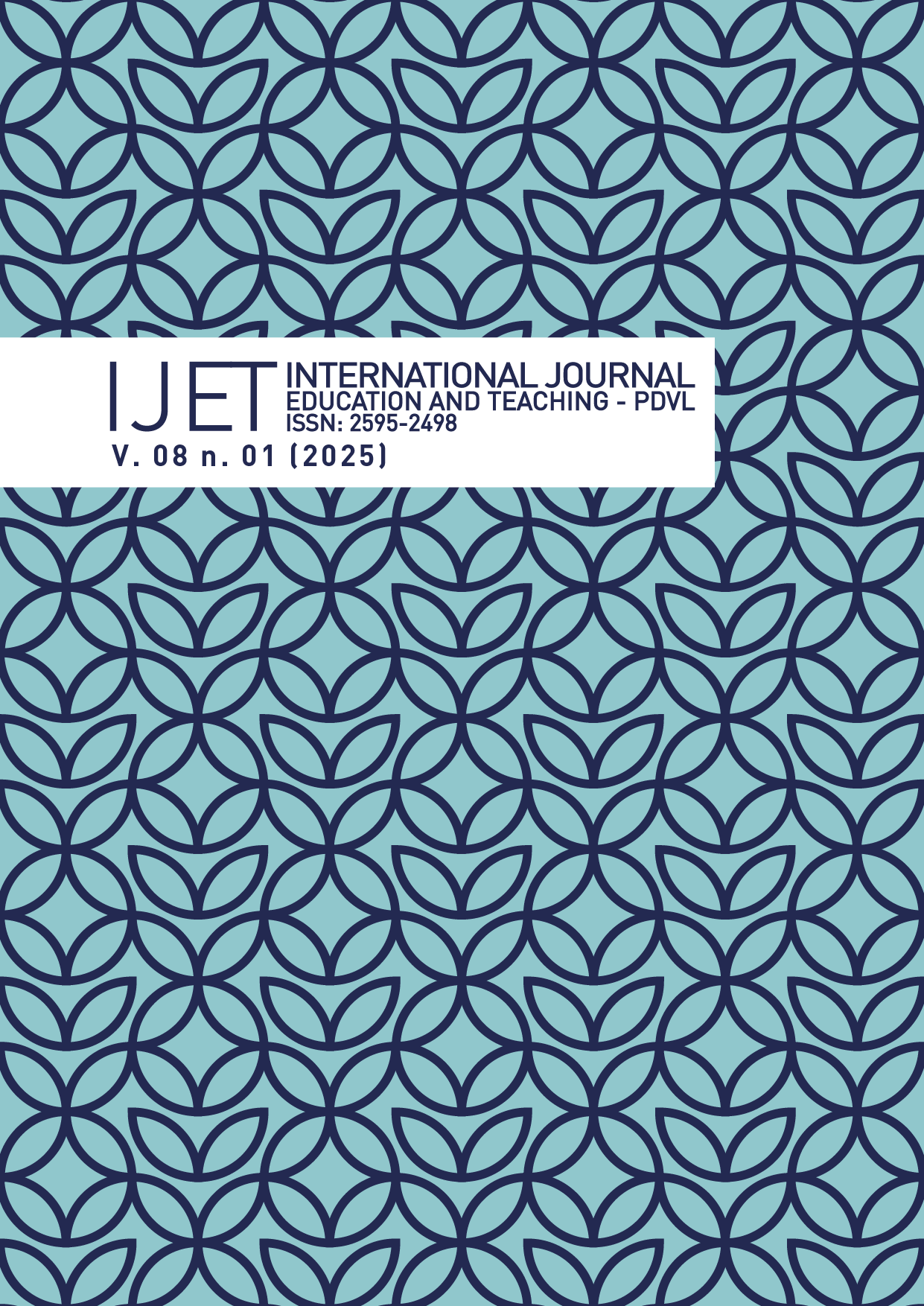MARKOV CHAINS APPLIED TO THE GAMBLER’S RUIN AS AN ARGUMENT AGAINST GAMBLING
DOI:
https://doi.org/10.31692/2595-2498.v8i1.248Keywords:
Markov Chains, Gambler’s Ruin, Fortune Tiger, Array, Modeling.Abstract
The present article aims to investigate, using Markov chains as an argumentative tool, the probability of player ruin in gambling, based on the game "Fortune Tiger." The analysis begins by questioning the viability of betting strategies and proposes a mathematical approach to show how the odds involved lead the player to ruin, regardless of the betting style. Our theoretical basis relies on the use of Markov chains, a probabilistic model that allows the analysis of stochastic processes in order to identify the transition between possible states, such as consecutive wins and losses in a game. In this case, we focus specifically on an application to the adapted problem of the gambler's ruin, which is frequently discussed in game theory and probability. The methodology consists of applying the ruin problem with probabilistic data extracted through measurements from the game in question and comparing the results with numerical simulations performed in Python, using as an analysis criterion the state transitions throughout the game in two different situations: first, when the house has more money than the player, and second, when the player and the house have equal amounts of money. The results confirm the hypothesis that, regardless of the betting style or strategy, the player faces a high probability of ruin as the number of plays increases. These findings strengthen the argument against the viability of gambling, highlighting the inevitability of loss, even in scenarios where the player adopts conservative strategies.
Downloads
References
Academia Lab. Andrey Markov. Academia Lab. Disponível em: https://academia-lab.com/enciclop%C3%A9dia/andrey-markov/. Acesso em: 15 out. 2024.
AMERICAN PSYCHIATRIC ASSOCIATION – APA. Manual diagnóstico e estatístico de transtornos mentais: DSM-5-TR. 5. ed. Porto Alegre, RS: Artmed, 2014.
ANDRADE, R. T. B. A probabilidade aplicada aos jogos de azar. 2017, 69 f. Dissertação (Mestrado em Matemática) – Universidade Federal da Paraíba, João Pessoa. 2017. Disponível em: https://repositorio.ufpb.br/jspui/handle/tede/9474. Acesso em: 25 set. 2024
ANTUNES, J, V. C. A responsabilidade civil dos influenciadores digitais no universo dos jogos de azar em plataformas online. 2024. p.1-18. Trabalho de Conclusão de Curso ( Bacharelado em Direito) – FAMINAS, Belo Horizonte, 2024. Disponível em https://bibliotecadigital.faminas.edu.br/jspui/handle/10.31.16.45/489. Acesso em: 26 set. 2024.
ASCHER, Abraham. The Revolution of 1905. Stanford, Calif.: Stanford University Press, 1988. p. 91.
BOLDRINI, José Luiz; et. al. Álgebra Linear. São Paulo: Harper & Row do Brasil, 1980.
BRASIL. Decreto-Lei n.° 3.688 de 3 de outubro de 1941. Lei das Contravenções Penais. Não paginado. Disponível em: https://www.planalto.gov.br/ccivil_03/decreto-lei/del3688.htm. Acesso em: 26 set. 2024.
CARVALHO, S. V. B.; COLLAKIS, S. T.; OLIVEIRA, M. P. M. T.; SILVEIRA, D. X. Frequência de jogo patológico entre farmacodependentes em tratamento. Revista de Saúde Pública, São Paulo, v. 39, n. 2, p. 217–222, 2005. DOI: 10.1590/S0034-89102005000200012. Disponível em: https://www.revistas.usp.br/rsp/article/view/31856. Acesso em: 27 set. 2024. DOI: https://doi.org/10.1590/S0034-89102005000200012
DUARTE, D. Loterias no Brasil : legalidade e ilegalidade. Revista Esmafe: Escola de Magistratura Federal da 5ª Região. Recife. n. 10, p. 189-211, dez. 2006. Disponível em: https://bdjur.stj.jus.br/dspace/handle/2011/27741. Acesso em: 27 set. 2024.
GOLMANAKI, Ali,; et. al. Cadeias de Markov. In: VII Bienal da Sociedade Brasileira de Matemática, 2014, Alagoas . 2021. Disponível em: https://im.ufal.br/evento/bsbm/download/minicurso/cadeias.pdf. Acesso em: 16 out. 2024.
GUSMÃO, R, A, V. Sistema de predição de escanteios asiáticos utilizando redes neurais artificiais. 2024, 40 f. Trabalho de Conclusão de Curso (Bacharelado em Sistemas de Informação) – Instituto Federal do Espírito Santo, Serra, 2024. Disponível em: https://repositorio.ifes.edu.br/handle/123456789/4527. Acesso em: 28 set. 2024.
LIMA, Elon Lages; CARVALHO, Paulo Cezar Pinto; WAGNER, Eduardo; MORGADO, Augusto Cesar. A Matemática do Ensino Médio – Volume 2. 3. ed. São Paulo: Sociedade Brasileira de Matemática, 2013.
MENEZES, M. E. S. Apostas esportivas on-line: regulamentação e tributação. 2023. 28f. Trabalho de Conclusão de Curso ( Bacharelado em Direito) – Centro Universitário do Planalto Central Apparecido dos Santos, Uniceplac. Gama – DF, 2023. Disponível em: https://dspace.uniceplac.edu.br/handle/123456789/2681. Acesso em: 30 set. 2024.
O'CONNOR, John J.; Robertson, Edmund F. Andrey Andreyevich Markov. MacTutor History of Mathematics Archive. Disponível em: https://mathshistory.st-andrews.ac.uk/Biographies/Markov/. Acesso em: 15 out. 2024.
OMAIS, S. Jogos de azar: análise do impacto psíquico e sociofamiliar do jogo patológico a partir das vivências do jogador. Rio de Janeiro. Juruá Editora, 2009.
RODRIGUES, M.; VIANA, H. Apostas online: governo analisa dados e pode proibir o uso do cartão do Bolsa Família para bets. G1. Brasília, set. 2024. Disponível em https://g1.globo.com/economia/noticia/2024/09/27/apostas-online-governo-analisa-dados-e-pode-proibir-o-uso-do-cartao-do-bolsa-familia-para-bets.ghtml. Acesso em: 4 out. 2024.
ROESCH, Sylvia Maria Azevedo. Projeto de estágio do curso de Administração: guia para pesquisa, projeto, estágios e trabalho de conclusão de curso. São Paulo: Atlas, 1999
SANTOS, Cristina Aparecida dos. Cadeias de Markov: uma conexão para conceitos de matrizes, probabilidades e grafos no ensino médio. 2022. 86 f. Dissertação (Mestrado Profissional) – Universidade Federal de Mato Grosso, Pontal do Araguaia, 2022. Disponível em: https://sca.profmat-sbm.org.br/profmat_tcc.php?id1=6664&id2=171054103. Acesso em: 16 out. 2024.
TEORIA E REVOLUÇÃO. Os bolcheviques e o movimento estudantil. Teoria e Revolução. Disponível em: https://teoriaerevolucao.pstu.org.br/os-bolcheviques-e-o-movimento-estudantil/. Acesso em: 15 out. 2024.
ZANELLA, Liane Carly Hermes. Metodologia da pesquisa. Florianópolis: SEaD/UFSC, 2006, 144p.

Downloads
Published
Conference Proceedings Volume
Section
License
Copyright (c) 2025 Kauana Rodrigues da Silva , Hilquias Santos de Oliveira , Edem Assunção Baima Neto , Samuel Vitor Alves da Rocha (Autor)

This work is licensed under a Creative Commons Attribution 4.0 International License.










